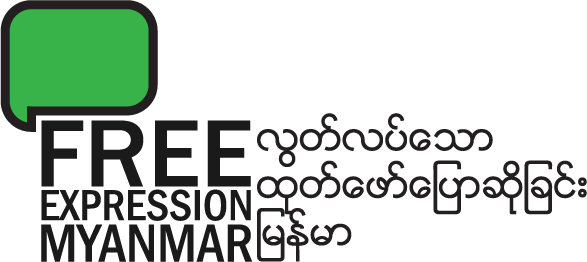Incitement (hate speech) — လှုံ့ဆော်မှု
When we use the term “incitement”, we are talking about speech or other acts of expression that advocate or promote hatred in a way that is intended to encourage individuals to commit acts of violence or other human rights violations against a protected group.
There are two problems that are seen in many countries around the world where incitement laws are used:
- Influential individuals directly incite violence or other human rights abuses without being held accountable, and without victims being protected or given redress;
- Laws on incitement are abused to persecute minority or vulnerable groups, or to shield the government from criticism.
Article 20, paragraph 2 of the ICCPR requires States to prohibit by law “any advocacy of national, racial or religious hatred that constitutes incitement to discrimination, hostility or violence”.
The prohibition of incitement to hatred restricts the right to freedom of expression but the restriction is legitimate under the international law, as Article 19 paragraph 3 of the ICCPR sets out that protection of rights of others and public safety and order can justify the restriction on freedom of expression.
UN
UN High Commissioner for Human Rights launched “the Rabat Plan of Action”, emphasising the following principles:
- Domestic legislation should accurately reflect the formulation of Article 20(2) of the ICCPR, and not adopt language that is vaguer or subject to broader interpretation.
- Incitement requires intent. To impose any form of sanctions, it must be proven that the speaker acted with the knowledge and purpose of encouraging others to commit hostility, discrimination or violence.
- Criminal sanctions are a last resort. Using administrative sanctions or civil remedies for incitement can be more effective.
- Any restriction on incitement should be regarded as a restriction on the right to freedom of expression and justified according to the three-part test set out in Article 19(3) of the ICCPR. Restrictions must be (i) provided for by law; (ii) in pursuit of a legitimate aim, namely the protection of the rights or reputations of others, the protection of national security, public order, or public health or morals; and (iii) be necessary in a democratic society.
Six factors
There are six factors that should be considered when deciding if speech is incitement or not:
- Context
- Identity of the speaker
- Intent of the speaker
- Content of the expression
- Extent and magnitude
- Likelihood and imminence of harm
Media and government should:
- Support independent pluralistic and diverse media
- Encourage media to promote tolerance and non-discrimination
- Give minorities opportunities to speak so that they are better understood
- Report in a factual manner, avoiding unnecessary references to race, religion, gender, etc.
- Raise awareness of discrimination and negative stereotyping through voluntary codes of conduct
လှုံ့ဆော်ခြင်းဟူသောဝေါဟာရကိုသုံးစွဲသောအခါ ၊ ပြောဆိုသောစကား သို့မဟုတ် အခြား သော ဖေါ်ထုတ် တင်ပြသောအပြုအမူများကိုဆိုလိုပြီးယင်းသည် အမုန်းတရားကိုတို်က်တွန်းသော၊ တိုး မြှင့်စေသော အပြုအမူဖြစ်ပြီး၊လူပုဂ္ဂိုလ်များကိုအကြမ်းဖက်မှုတစ်ခုကိုကျူးလွန်မိစေရန်အားပေး သည်။ သို့မဟုတ် အကာအကွယ်ပေးထားသော လူစု၏အခြားသော လူ့အခွင့်အရေးများ ကိုချိုး ဖေါက်ခြင်း ပင်ဖြစ်သည်
လှုံ့ဆော်မှုအားတားဆီးပိတ်ပင်သောဥပဒေကိုသုံးစွဲသောကမ္ဘာပေါ်ရှိနိုင်ငံများစွာတွင်တွေ့မြင်ရ သည့်ပြဿနာနှစ်မျိုးရှိသည် ။
- လွှမ်းမိုးမှုရှိသောလူပုဂ္ဂိုလ်ကတိုက်ရိုက် အကြမ်းဖက်မှုကိုလှုံံ့ဆော်ခြင်း သို့မဟုတ် တာဝန်ခံမှု မရှိဘဲ နှင့် ခံရသူများအားကာကွယ်မှုမပေးဘဲအခြားသောလူ့အခွင့်အရေးများကိုချိုးဖေါက်ခြင်း
- လှုံ့ဆော်မှုများအားတားဆီးပိတ်ပင်သောဥပဒေများအားလူနည်းစုသို့မဟုတ် အကာအကွယ် အကူ အညီမဲ့နေသူများအားအရေးယူအပြစ်ပေးရန် အလွဲသုံးခြင်းသို့မဟုတ် အစိုးရအား ပြစ် တင်ဝေဖန်ခြင်းမှကာကွယ်ရန်အတွက်အသုံးပြုခြင်းများ
အိုင်စီစီပီအာ ။အပိုဒ်၂၀၊ စာပိုဒ်ခွဲ ၂ တွင် ဖေါ်ပြထားသည်မှာ၊ အကြမ်းဖက်မှု၊ရန်လိုမှု၊လူမျိုးရေးခွဲခြားမှုများအတွက်လှုံ့ဆော်သောဘာသာရေးဆိုင်ရာ၊ လူမျိုး ရေး ဆို်င်ရာ၊အမျိုးသားရေးဆိုင်ရာလှုံ့ဆော်ခြင်းများကိုအားပေးကူညီသည့်မည်သည့် အမုန်းစကား ကို မဆိုဥပဒေဖြင့် တားဆီးပိတ်ပင်ရမည်။
အမုန်းစကားဆိုလှုံ့ဆော်ခြင်းကိုတားဆီးပိတ်ပင်ခြင်းသည် လွတ်လပ်စွာဖေါ်ထုတ်ပြောဆိုခြင်းကိုကန့်သတ်ရာရောက်သော်လည်းကန့် သတ်မှုသည် နိုင်ငံတကာဥပဒေအရ တရားဝင်သည်။အာတီကယ်၁၉ ၏ စာပိုဒ် ၃ အရအခြား သော အခွင့် အရေးများ၊လူထုလုံခြုံစိတ်ချရေးနှင့် တည်ငြိမ်အေးချမ်းရေးတို့ကိုကာကွယ်ရန်အလို့ငှာ လွတ်လပ် စွာ ထုတ်ဖေါ်ပြောဆိုခြင်းအားပိတ်ပင်သော်လည်းတရားမျှတမှုရှိနိုင်သည်။
ကုလသမဂ္ဂ လူ့အခွင့်အရေးဆိုင်ရာမဟာမင်းကြီး က“the Rabat Plan of Action”ဆိုသည်ကိုတင်ပြခဲ့ သည်။ ယင်းကပြဆိုသည်မှာ
- အဓိကဝေါဟာရများကိုရှင်းလင်းစွာဖွင့်ဆိုသင့်သည်။ ။ အိုင်စီစီအာ၏ အပိုဒ်၂၀(၂) ရေးသား ဖေါ်ပြချက်ကို ပြည်တွင်းတရားဥပဒေများသည် တိကျစွာထင်ဟပ်ရမည်။ ထို့ပြင် ကျယ် ပြန့်သောဖွင့်ဆိုချက်ကိုပေးနိုင်သော၊မတိကျသောဘာသာစကားကိုမသုံးရန် ဖြစ်သည်။
- လှုံ့ဆော်မှုတွင်ရည်ရွယ်ချက်ရှိရမည်။ ။ အကြမ်းဖက်ခြင်း၊လူမျိုးရေးခွဲခြားခြင်း၊ရန်လိုခြင်းတို့ ကိုဖြစ်ပေါ်စေမည့်လှုံ့ဆော်မှု ကိုပေါ်ပေါက်စေသည့်အမုန်းစကားအားအားပေးတိုက်တွန်း မှု ကိုရည်ရွယ်ပါသောတိုက်ခိုက်မှုဟုမှတ်ယူရမည်။ မည်သည့်ပြစ်ဒဏ်ကိုမဆို ချမှတ်မည်ဆိုပါက ထိုစကားကိုပြောသူသည် အကြမ်းဖက်မှု၊လူမျိုးရေးခွဲခြားမှုနှင့်ရန်လိုမှုများကိုကျူးလွန်ရန် တိုက် တွန်း အားပေးသည့်ရည်ရွယ်ချက်နှင့်အကြောင်းအချက်များပါရှိသည်ဟုသက်သေပြရ မည်ဖြစ် ပါ သည်။
- ရာဇဝတ်မှုအရပြစ်ဒဏ်ပေးခြင်းများသည် နောက်ဆုံးဖြေရှင်းမှုပင်ဖြစ်သည်။ တရားမမှုနှင့်အုပ်ချုပ်ရေးဆို်င်ရာပြစ်ဒဏ်များသည်သာလှုံ့ဆော်မှုကိုဖြေရှင်ရန်အတွက် ပိုမိုသင့်တော်သည့်နည်းများပင်ဖြစ်သည်။
လှုံ့ဆော်မှုကိုကန့်သတ်တားဆီးခြင်းများသည် ရှေ့အခန်းများတွင်ဖေါ်ပြခဲ့သည့်သုံးဆင့် စစ်ဆေးနည်းနှင့်ကိုက်ညီရမည်ဖြစ်သည်။
-
လှုံ့ဆော်ခြင်းကိုတားဆီးပိတ်ပင်သည့်မည် သည့်ပိတ်ပင်မှုကိုမဆိုလွတ်လပ်စွာထုတ်ဖေါ်ပြောဆိုခွင့်ကိုတားဆီးပိတ်ပင်ပင်ခြင်းဟုမှတ်ယူရမည်။ထို့ပြင် ICCPR ၏အပိုဒ် ၁၉(၃) အရအဆင့်သုံးဆင့်စစ်ဆေးနည်းအရတရားမျှတမှု ရှိကြောင်းပြရမည်။ ကန့်သတ်မှု ကို(၁)ဥပဒေအရ ပြဌာန်းပေးရမည်။ (၂)တရားဝင်ရည် ရွယ်ချက်များဖြစ်သည့်အခြားသူများ၏ဂုဏ်သိက္ခာကိုထိန်းသိ်မ်းရန်၊အမျိုးသားလုံခြုံရေး၊လူထု တည်ငြိမ်အေးချမ်းရေးကို ထိန်းသိမ်းရန် သို့မဟုတ် ကျန်းမာရေး၊ သို့မဟုတ်၊ ကိုယ်ကျင့်တရားကို ကာကွယ်ရန် စသည်တို့ ဖြစ်သည်။ (၃)ဒီမိုကရေစီလူ့အဖွဲ့အစည်းအတွက်လိုအပ်ချက်ဖြစ်ရ မည်။
တစ်စုံတစ်ခုသောပြောဆိုခြင်းကို လှုံ့ ဆော်မှု အရာမြောက်မမြောက် ဆုံးဖြတ်ရန် အောက်ပါအချက် ခြောက်ချက်ပေါ်တွင် စဉ်းစားဆုံးဖြတ် ရမည်။
၁။ အကြောင်းအရာ၊အခြေအနေ
၂။ ထုတ်ဖေါ်ပြောဆိုသူ၏ အချက်အလက်
၃။ထုတ်ဖေါ်ပြောဆိုသူ၏ရည်ရွယ်ချက်
၄။ထုတ်ဖေါ်ပြောဆိုခြင်း၏ ရည်ရွယ်ချက်
၅။အတိုင်းအတာနှင့်လေးနက်မှု
၆။ အန္တရာယ်ဖြစ်နိုင်ချေ
မီဒီယာနှင့် အစိုးသည် -
- လွတ်လပ်သော၊ဗဟုအမြင်ရှိသော၊ကွဲပြားခြားနားခြင်းကိုလက်ခံသော မီဒီယာကိုထောက်ပံ့ပေးရမည်။
- သာတူညီမျှမှုနှင့် လူမျိုးရေးမခွဲခြားရေးကိုမြှင့်တင်ပေးနိုင်မည့် လွတ်လပ်သော၊ ဗဟုအမြင်ကိုလက်ခံသော၊ကွဲပြားခြားနားခြင်းကိုလည်းလက်ခံသောမီဒီယာ ကိုအားပေးကူညီရမည်။
- မီဒီယာတွင် လူနည်းစုတို့၏ အမြင်နှင့်အသံများကိုရရှိနိုင်ရန်ဖေါ်ထုတ်နိုင်ရန် ဆောင်ရွက်မှုများ မြင့်မား လာရေး ကိုလည်း ပြုလုပ်ပေးရ မည်။
- လူမျိုးရေးခွဲခြားမှုများ၊ လူမျိုး၊ဘာသာ၊ကျား/မခွဲခြားခြင်းနှင့် လူအုပ်စု၏ လက္ခဏာရပ်များအား မလိုအပ်ဘဲ ရည်ညွှန်းဖေါ်ပြခြင်းများအား ရှောင်ရှားရမည်။
- ခွဲခြားဆက်ဆံခြင်းနှင့် အနှုတ်သဘောဆောင်သော ခေါက်ရိုးမြင်သတ်မှတ်ချက်များကြောင့် ဖြစ်ပေါ်လာသော ထိခိုက်မှုအကျိုးဆက်များအကြောင်း အသိပညာပေးမြှင့်တင်ရမည် ။
